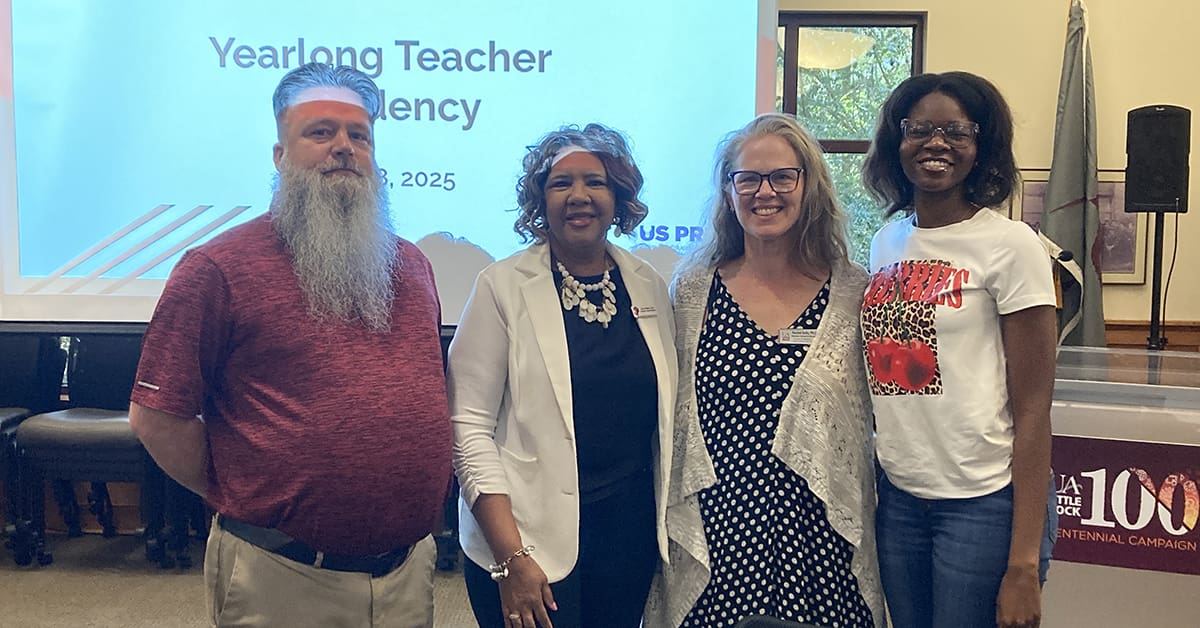Trojan Teacher Residency Panel Kicks Off Third Year with Advice and Encouragement for New Residents, Mentors

The University of Arkansas at Little Rock School of Education welcomed the 2025-26 cohort of the Trojan Teacher Residency Program with an inspiring panel at the Bailey Alumni Center.
The Trojan Teachers Residency Program provides year-long, paid residencies for teacher candidates who are paired with experienced mentor teachers in local schools in central Arkansas. Supported by a grant from Forward Arkansas, the immersive program gives aspiring teachers the opportunity to gain hands-on experience in the classroom throughout an entire school year, preparing them to be day-one ready as educators when they graduate.
The July 28 panel served as a highlight of orientation day and marked the launch of the program’s third year, when residents will be teaching in Jacksonville North Pulaski School District and Little Rock School District. It featured current educators who previously completed the residency program and a longtime district partner who has helped shape its success.
Dr. Rachel Eells, Windgate endowed director of the School of Education, moderated the panel, which included Chadwick Comer, a seventh grade English teacher who completed his residency in the program’s first year; Tinaya Brown, a May graduate of the program who will teach kindergarten at J.A. Fair K-8 Preparatory Academy in the fall; and Dr. Janice Walker, assistant superintendent at the Jacksonville North Pulaski School District.
“This orientation is about helping our new residents learn from those who have walked this path before,” Eells said. “Our panelists are examples of what this program can do to prepare teachers to succeed.”
Comer shared how he transitioned from observing his mentor teacher to becoming an active co-teacher early in his residency.
“I quickly realized this was a shared classroom,” he said. “My mentor made me feel welcomed, and I adapted fast. That support allowed me to grow and eventually lead the class with confidence.”
Brown emphasized the importance of staying organized and avoiding procrastination.
“If you start doing things at the last minute, it won’t work,” she said. “You have to think about the performance of your students and stay ahead.”
Walker highlighted the impact the program has had on her school district, particularly in recruiting and retaining quality educators.
“Having residents in our district has changed the landscape,” Walker said. “When I walk into classrooms, it can be hard to tell who is the resident and who is the teacher. They’re contributing so much. This is a journey, and it’s about building trust and empowering future teachers.”
Throughout the panel, the speakers underscored the value of reflection, honest feedback, and strong relationships between residents and mentor teachers.
“I needed brute honesty,” Brown recalled. “Even if it hurt my feelings, I wanted to improve. I made actionable steps and implemented them.”
Comer echoed the importance of reflection and co-planning between himself and his mentor.
“Daily reflection helped me improve and build a template for my first year of teaching,” he said. “It gave me a foundation.”
Eells encouraged residents to embrace the program’s supportive structure.
“This experience gives you the freedom to try new things while having someone there to guide you,” she said. “That’s rare in education.”
The panelists also shared advice on building relationships with students and their school communities.
“Build bonds with your mentor teacher, your students, and your school,” Comer suggested. “Those are the people you’ll work with for the year and maybe for many years to come.”
Walker said that school districts get the benefit of working with and training skilled residents for a year, which is an excellent recruitment tool.
“With the training that’s given here at UA Little Rock, you are coming in with a great skill set,” Walker said. “The benefit that we get is a year-long interview process. The goal of our district is to hire every resident to be a part of our district. I call it our family. If we instill the very best in you, you will serve the students with excellence.”
